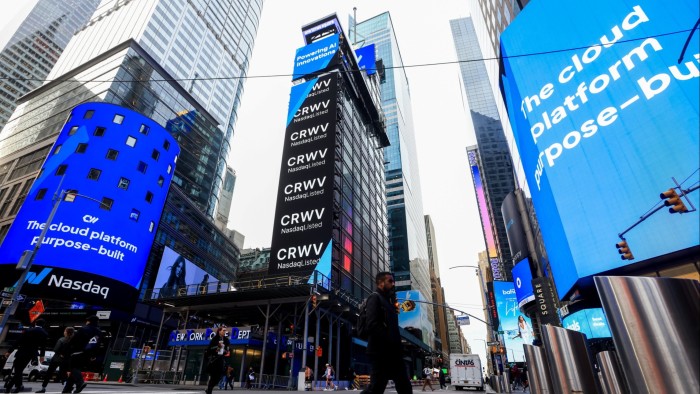Unlock the Editor’s Digest for free
Roula Khalaf, Editor of the FT, selects her favourite stories in this weekly newsletter.
The public markets are having a hard time valuing any single AI company. Putting two together then seems like an even more formidable task. That is why the tech industry is closely watching the planned acquisition of Core Scientific by CoreWeave as a sector benchmark — particularly given a sell-off in the acquirer’s share price.
CoreWeave, an AI “hyperscaler” backed by the likes of Blackstone and Magnetar Capital, sells data centre computing power. It went public in March at a price of $40 per share.
By June, its shares rocketed to more than $180, implying a total valuation of more than $100bn. After a weak earnings report last week, its shares drifted below $100, though still well above its IPO price. The Financial Times has reported that several top holders just also unloaded some of their CoreWeave shares after a lock-up provision had expired.
In early July, CoreWeave struck a deal to buy the publicly traded Core Scientific, a major supplier of data centre capacity and power to CoreWeave. CoreWeave said the combination would save over $10bn in expected future payments to Core Scientific, an example of a so-called vertical integration acquisition.
But instead of stumping up third-party debt to pay cash for Core Scientific, CoreWeave is paying in its own shares, giving up about a tenth the company. When the deal was announced, Core Scientific was valued at an equity value of $9bn, a 60 per cent premium to where it traded prior to the deal rumours.
But at least some Core Scientific shareholders are, understandably, not so happy today. One hedge fund is trying to rally shareholders to vote down the deal, arguing the drop in CoreWeave shares has commensurately reduced their payout and, regardless, the deal terms more generally undervalues Core Scientific’s long-term prospects.
The plot will thicken in the coming days as a securities filing is soon to be made public detailing the negotiations between the two companies to set the merger terms. The filing will also share the financial analysis that the investment bankers involved have used to justify the price for Core Scientific. For established companies in the AI industry such as Nvidia or power plant operators that have long track records, public shareholders have been happy to bid up their shares.
The daily mark-to-market valuation that comes with being public is trickier for emerging companies such as CoreWeave and Core Scientific. These typically have revenue and profits that are currently marginal compared with their respective valuations but are supposed to quickly increase. Thus it should then be no surprise that there is going to be serious dissent on a transaction that requires two different sets of shareholders to reach consensus.
Core Scientific had originally been a bitcoin miner, which then collapsed into bankruptcy amid the 2022 “crypto winter”. Its energy infrastructure is, however, now extremely valuable for the taxing requirements of AI workloads. The hedge fund Two Seas, which has taken a 6 per cent stake in the company and is rallying other shareholders to hold out for a better CoreWeave offer, says Core Scientific can prosper as a standalone company if necessary. For its part, CoreWeave insists that Core Scientific should be happy to be part of the enlarged group given that the resulting synergies will compound for all shareholders over time.
A generation ago in the dotcom boom, companies with inflated stock values combined with the aim of capturing the transformative gains of innovative internet technologies. Most notably, the $165bn AOL-Time Warner merger was supposed to revolutionise the media industry. That vision mostly failed to materialise but both companies muddled through as the stock swap deal did not result in excessive debt.
But the fluctuations in CoreWeave’s stock price no doubt have caught the attention of the private AI start-ups. The AI labs behind the language models such as Open AI, xAI, and Anthropic have raised at least tens of billions of dollars with valuations that only rocket upwards, even if they have little in the way of profits or big revenues just yet. Watching the melodrama between CoreWeave and Core Scientific probably does not give them much enthusiasm for facing the music of public markets.
Such markets are, however, a great disciplining force, pushing companies to constantly prove their business models to the broader investment community. Many companies end up sold because investors default to risk aversion when a bid comes in. If Core Scientific shareholders decide to hold out for a better deal or otherwise back the company’s prospects as an independent entity, it is a signal that public investor faith in the AI revolution remains strong. And should they take the current deal, it might be an indication that confidence is shakier.
